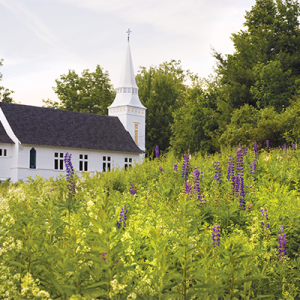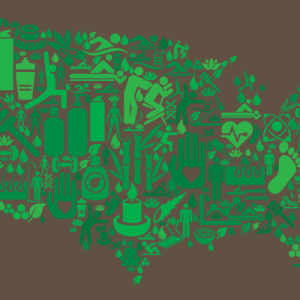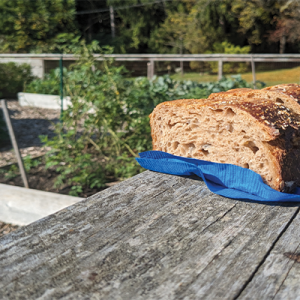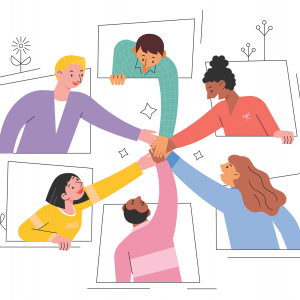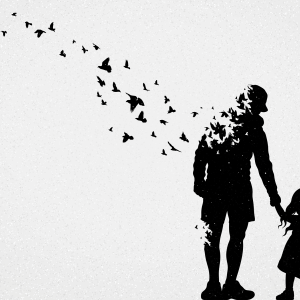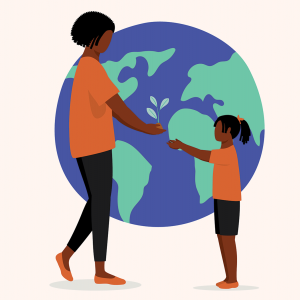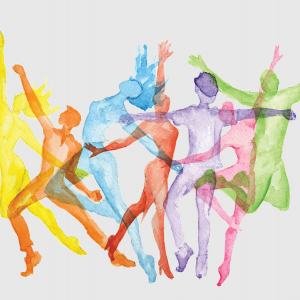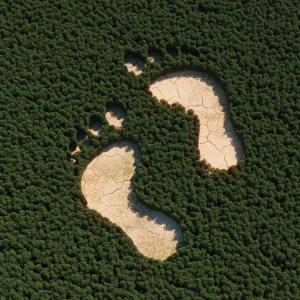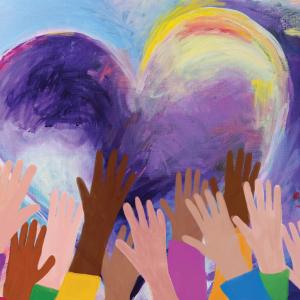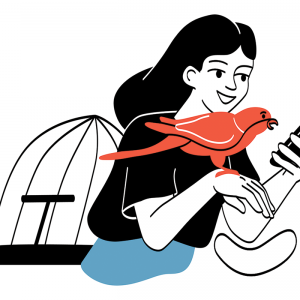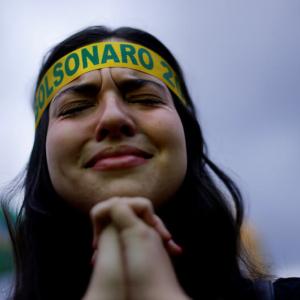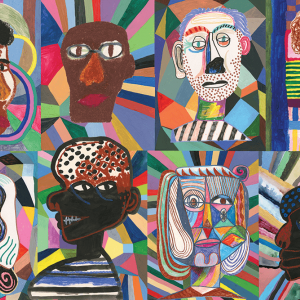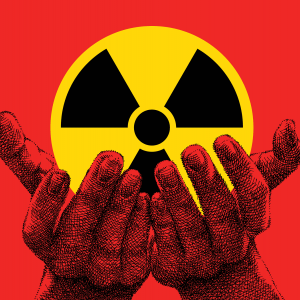
Liuan Huska is a freelance writer, co-author of the children’s book My South American Classroom, and the author of Hurting Yet Whole: Reconciling Body and Spirit in Chronic Pain and Illness. She coordinates A Rocha USA’s Chicagoland Churches of Restoration cohort and lives on ancestral Potawatomi land near Chicago.
Posts By This Author
Cultivating a Better Future
To survive this moment, can we find hope in what can sprout in the rubble of history?
AS WE CLOSE the first quarter-century of the new millennium, the situation seems dire. Political violence, wars, and disasters abound. But zooming out from the immediacy of our moment may help us gain some footing for what’s to come.
Half a century ago, in 1975, the Vietnam War ended, Bill Gates and Paul Allen founded Microsoft, and Taco Bell was beginning its ascendancy in fast food chains.
A century ago, the United States was in the thick of the Roaring ’20s, a time of opulence and optimism, of flappers, radio, and moving pictures. But the bubble of endless economic expansion was about to burst with the 1929 stock market crash and the subsequent Great Depression. The rich got richer—until society couldn’t sustain it anymore.
Why Climate Work Keeps Me in Church
FOR YEARS, I’VE been halfway out the church door when it comes to finding spiritual resources that support my deep grief over our sick planet. While there are a growing number of faith leaders teaching on climate change, I confess it sometimes feels too late for people like me who are already losing confidence in institutional Christianity. It’s easier, often, to join like-minded people beyond church walls.
But today I still go to church. In fact, I’m working with A Rocha USA, a nationwide creation care group, to launch a yearlong program for churches in my area yearning to respond faithfully and practically to creation’s groans. Why stay here, rather than turning my energy toward other environmental efforts?
The harvest is ripe. More and more Christians from across the theological spectrum want their faith communities to do something about our environmental crises. A Rocha USA regularly receives requests from churches asking for practical creation care support. These churches might not readily partner with secular environmental groups, but having a theologically credible guide makes all the difference between concerned paralysis and meaningful action.
Churches and denominations also own a significant portion of land around the world. Changing land stewardship practices in a few churches has the potential to ripple across networks and shift norms. What if it became as normal for a church to convert a portion of their land to growing native plants as it is for a church to run a neighborhood soccer ministry?
Lessons From a Local Political Campaign
AFTER THE NOVEMBER 2024 elections, I felt called to local community action. As I voiced despair to my therapist over the demise of democracy on a national level, she asked, “What is within your circle of control?” A friend had just decided to run for mayor of our town. This was one area where I could do something.
As a journalist, I typically don’t support specific candidates publicly. This time, I left my neutral observer role to get in the local political trenches as a volunteer campaign team member. Even at this level, it gets nasty — mudslinging, blatant lies, threats, bribes, and all those things that give regular folks a bellyache.
Long story short, my friend and our slate of city council candidates won. I’m still amazed by the fact that ordinary people who wanted change unseated five incumbents bent on preserving the status quo.
Reflecting back on how we did it, and how we might do it again, one strategy rises to the surface: We activated our social networks.
I Want to Make America Healthy Again, Too
Maybe the renewed focus on nutrition can be an opening for conversation and collaboration.
I COULD FIT right in with crunchy “MAHA” moms.
I wore my babies in patterned baby carriers, puréed organic squash and bananas for their first foods, and obsessed over toxins and microplastics in everything. I daydream about backyard chickens and growing enough tomatoes and cucumbers to last through the winter storedin neat rows of mason jars in my pantry. I, too, want cleaner water, soil, air, and food for my children.
The “Make America Healthy Again” movement is a strange “horseshoe alliance” of far-right and far-left hippies, homesteaders, vaccine skeptics — maybe even some who make their own granola. At its heart is a growing mistrust in the scientific establishment and a shrinking definition of health — from something we work toward together as a society to something we defend and purchase for ourselves and our families.
As a person with resources, I feel the easy draw of that narrowed mentality. If the air or water is polluted, I can buy fancy purifiers. If the soil is contaminated, I can pay to haul in garden dirt or move to land farther from polluting sources. But there are fewer and fewer places to go to avoid wildfire smoke, hurricane damage, or toxic emissions. Seeking my children’s health requires more than individualistic self-protection. It requires seeking the health of all people and the entire planet.
Gnarly Questions for Christ-Followers
Can we welcome the stranger and honor our human limits at the same time?
OUR EYES MET as I walked up the concrete stairs from the Chicago Water Taxi’s Michigan Avenue stop. She held up a cardboard sign, her hand on a stroller with two young girls in puffy teal jackets inside.
Alejandra, as I’ll call her, had arrived in the city with her family two weeks earlier, after a grueling journey from Venezuela by bus, car, plane, and on foot through the Darién Gap. I couldn’t catch all the details in her rapid Spanish, but I understood she was staying at a nearby migrant shelter and that she wanted to find work to pay for her mother’s medical treatment back in Venezuela.
At the end of our conversation, I gave her all the cash I had; she asked if she could have my phone number. I gave it, but as I walked away, I wondered, “What have I gotten myself into?”
The Script Is Not Written
Applying “beginner’s mind” helped me with my mother’s cancer diagnosis. I want to approach the next four years the same way.
I WRITE THIS two months before the November 2024 U.S. presidential election, knowing that it will land with you, dear readers, after all the votes are in and the course for the next four years is likely set. My insides lurch thinking about the potential outcomes. We are in the middle of the decisive decade for large-scale action to mitigate the worsening effects of climate change. Going in one direction or the other feels, sometimes, like a turn toward life or death for the planet.
Like many, I have learned to apply lessons from navigating the grief and pain of personal losses to our collective crises. I lost my dad suddenly to colon cancer earlier this year. A few weeks later, my mom was diagnosed with stomach cancer. Grasping for predictability amid the unknown, I tried to superimpose my dad’s illness onto my mom’s future. It did not help. My anxiety skyrocketed.
What helped, instead, was applying what Zen practitioners call “beginner’s mind.” A beginner has no background knowledge about a situation. They have no expectations for how things might unfurl. Approaching a situation as a beginner can open pathways that experts did not see.
A Lutheran Church Tried To Grow Their Own Communion Bread
Most communion bread is made in a factory. How did the process lose the human touch?
A LITTLE OVER a year ago, members of Ann Arbor’s Zion Lutheran Church in Michigan stood on an L-shaped plot bordering their church garden. Those 800 square feet of ordinary lawn were on the cusp of transformation, about to become the source of Zion’s own Communion bread.
While Christians traditionally think of Communion as transforming partakers during the church service, project leader Betsy King-McDonald wanted to explore the life-giving properties of the Eucharist at an earlier stage — starting in the soil.
“How can we foster life in all the choices we make to the table?” she asked. This question led King-McDonald, a doctoral student at Western Theological Seminary, to partner with Zion Lutheran in growing heirloom wheat for their Communion bread.
In the slanting October light, members rototilled the church lawn. Youth lugged wheelbarrows of wood chips from the parking lot. Then Joet Reoma, a local master gardener and board member of Project Grow, a local nonprofit that facilitates community gardens, directed participants in a complex ritual that resembled making a dirt lasagna. The “lasagna” was not for humans, but for the microbial life in the recently turned soil.
In a trademark black cap with tag still attached, his name scrawled on the tag in bold black marker, Reoma called out basic permaculture steps: First, spread fresh wood chips, high in nitrogen but slow to decompose. Next, add a layer of vermicompost — worms with their eggs and castings, ready to break down the organic matter. Sprinkle cornmeal on top, energizing the worms and kick-starting mycelial growth in the wood chips. Finally, two more layers; one of decomposed wood chips and one of compost. Now, the soil community was ready to receive the wheat seeds.
This elaborate process of feeding the soil that would nurture the church’s Communion wheat expressed a deep eucharistic truth — the process and the produce hold the power of life.
Rarely do churches interrogate how liturgical elements support life all along the way — from soil to markets to table. As King-McDonald found, tending to the process clears a path for deeper place-based Christian discipleship.
After poking neat rows of holes in the living soil, Zion Lutheran’s team dropped wheat kernels into the darkness, covered them, and spread a layer of straw over it all.
Love Your Neighbor. Go to a City Council Meeting
THE THREE SHORT rows of folding chairs for the public were not full, but this was the highest attendance I had seen at a city council meeting. I was curious how the mayor and council members would respond this time. Community members had showed up to support a couple fighting what they felt was an unfair $20,000 building code violation fine.
After some preamble, the floor opened for public comment. A handful of residents of the small midwestern city where I live came to the podium for their allotted three minutes. “We’ve lost the adult in the room,” one woman said. “I implore the council to consider the human aspects,” a man said. He asked if the building board of appeals would be seated to review this case.
The mayor blinked, expression unchanged, “We can’t comment, and your time is up.”
I’m Proud of How My Dad Faced His Final Days
Accompanying him as he died taught me about the holy work of presence.
MY FATHER TOOK his last breath on April 2, 2024, in his home in Southern California. My sister, my aunt, and I were present. He was 68.
Just days before, we were considering chemotherapy. But the illness had already swung into high gear, and his body shut down quickly. The day before my dad’s first chemo appointment, he died.
My dad was a complicated man who kept many secrets. He had written “Metastatic Stage IV Colon Cancer” in a notebook in mid-February, over a week before he told any of us how far the cancer had spread. In his final weeks, he began to relinquish independence and control, starting with giving me durable power of attorney over his affairs just an hour before he went into surgery to remove the tumor in his colon. Up until then, he didn’t want to sign the papers.
Getting Our Hands Dirty To Create a Better World
We were made for this.
IT'S PARTLY THE times and partly my own overthinking, but lately my mind keeps going toward the ways it could all fall apart. American democracy feels fragile, like a teacup on a saucer that’s partly hanging over the table’s edge. And companies and governments, though fully aware of what they’re doing, continue to tug voraciously at the threads that hold our ecosystems together, permitting more pipelines and drilling and business as usual.
Some have called our current era “the dying gasps” of late capitalism. The bubble of exponential economic growth, powered by the extraction of millions of years of decayed organic matter stored as carbon-rich fuel beneath the ground, can’t last forever. Neither can our living beyond the Earth’s means, though the endless options on e-commerce sites suggest otherwise.
It is too easy to surround myself with shiny new things to ease the sense that the world as we know it is ending, to buffer my sense of self with what feels familiar and safe. But then I wouldn’t be awake to what is being birthed in the wake of the dying colonial project. As much as it’s terrifying and full of risks, I want to get my hands dirty in the collective creation of a better world.
Hard Times Require Furious Dancing
The power of doing ordinary things in solidarity with those who cannot.
A WEEK AFTER the Hamas attacks on Israel in October, I found myself dancing the Cha-Cha Slide.
The setting was the Matthew 25 Initiative Gathering, a group of Anglicans walking in their communities alongside the most vulnerable, from refugees to the elderly. We had just heard from members of Telos, a peacemaking group with contacts on the ground on both sides of the Israel-Palestine divide. Shock, uncertainty, and grief hung thick among us. And now, we were invited to dance.
From Sufi whirling to Albanian folk dancing to krumping, dancing is an outlet used by many people, especially those who have been oppressed, to express longings and outrage that go beyond words. As one of Alice Walker’s poetry books declares, Hard Times Require Furious Dancing.
Like other intense physical activities, dancing brings us from the realm of the mind, where images and memories swirl and ruminations loop endlessly, to the body — the realm of breath, beat, sweat, sound, and movement. It gives us something to do with our terror, anger, and confusion. It grounds us in the here and now.
Facing the Possibility of Disaster With Open Palms
ALONG INTERSTATE 10 in southeast Texas, a billboard showcases a wrecked house, presumably from a hurricane, and the words, “The Next Disaster Is Coming. Are You Ready?” I spent a month this summer driving past this sign, enduring a heat dome while
visiting family.
A year of intensifying disasters, from wildfires to extreme heat to flooding, has all of us thinking about how to prepare for the next “big one,” whatever that may be in our area. Ready.gov, which this billboard points to, offers practical tips for everything from attacks in public places to tsunamis: Create a plan, gather supplies, map an escape.
While I want to be ready for a disaster, it’s too easy to go from thatto catastrophizing, from storing supplies to sitting back under the illusion of self-reliance and control. The billionaires who build luxurious bunkers and the preppers all-consumed with societal collapse show us the extremes of disaster preparedness. It can come with spiritual pitfalls, as the Parable of the Rich Fool illustrates.
In the parable, found in Luke 12:13-21, Jesus warns about relying on lots of stuff for a false sense of security. The rich man stored his surplus grain in huge barns and then sat back to enjoy life, but his life was taken from him that very night. All his efforts couldn’t keep him from harm. Jesus concludes, “This is how it will be with whoever stores up things for themselves but is not rich toward God.”
Back-to-School Gun Violence Blues
The violence-tinged reality of sending children to school in America.
AFTER A TEENAGER shot dead 19 children and two teachers in an elementary school in Uvalde, Texas, last year, I spent two weeks putting my children on the bus to school with a pit in my belly. Then the term ended, and I breathed relief. I would not have to live with this low-level dread for another year.
My family has been on sabbatical in South America for the past 12 months, homeschooling our three boys. Though we’ve faced other risks, the possibility of my kids being shot in school was not one of them. Not only were they not attending school, but the countries we visited also have stricter gun regulations than the United States.
In the U.S., the purchase of guns has soared — gun ownership is estimated to be more than 120 per 100 people, according to GunPolicy.org. Gun-related deaths in the U.S. also top every other high-income country, at more than 12 per 100,000 people annually. Compare that to Ecuador, where we spent part of our sabbatical. In 2017, it had 2.7 guns per 100 people and approximately three gun-related deaths per 100,000 people. Our sabbatical year has been a window into what it’s like to parent school-aged children without the shadow of school shooting anxiety.
We're All on a Climate Pilgrimage
The steps we must take as we grieve the loss of a stable natural world.
IN COLOMBIA, the highest rainfalls in 40 years had reduced coffee production by nearly one-third at the end of 2022. In the United States, tornado deaths for the first quarter of 2023 were already nearing the annual average. In Jakarta, Indonesia, the government barrels forward with constructing a 29-mile sea wall to protect the city, which is sinking under rising sea levels.
Everywhere, the planet is changing. Land once known for certain weather patterns, flora, and fauna is becoming strange and unfamiliar. Ways of life forged from old patterns are crumbling. Communities scramble to find new ways to farm, fish, graze, and live in what increasingly feels like uncharted territory.
Many have taken up the language of grief and loss to guide us through this turbulent era. Australian philosopher Glenn Albrecht even coined the term “solastalgia,” which describes “the homesickness you have when you are still at home.” We long for the forests and meadows of our childhoods, alive with spring peepers and monarch butterflies, which today seem diminished or have completely disappeared, paved over by strip malls and subdivisions. The land that shaped us is still there, but it’s not the same.
Working with a Climate Skeptic to Heal the Land
“I’m learning not to let my own views keep me from interacting with another human being whose narratives about the world are so different from my own.”
I NODDED ALONG with everything in the holistic permaculture course until day four, when things went off the rails. My family and I were at a farm in Bolivia, volunteering and learning about land design, groundwater recharging, alternative energy technologies, and returning fertility to the earth. Day four’s topic was community-building, which sounded innocuous enough.
Our host and instructor was a man from New Zealand who has farmed two acres in a remote Bolivian valley for nearly a decade. He talked about the importance of local decision-making, how focusing on global problems over which we have little influence can leave us feeling disempowered. Human-induced climate change, he added, is another story the oligarchs at the top are telling to stoke our fears and get us to surrender our freedoms. That and the pandemic.
Our host’s views are extreme. But he is among a growing group of back-to-the-land conservatives who don’t fit my categories. He disbelieves mainstream climate science, yet he is installing solar ovens, composting toilets, and bioconstructed buildings on his property. He scoffs at “wokeism,” which he sees as another form of top-down control, yet he deeply respects the local Indigenous community and attends the Quechua-only neighborhood meetings with surrounding farmers.
Living a Life of Abundance Starts with Community
Abundance is less about how much we have and more about how much we share.
AS SOMEONE WHO has lived with chronic pain and come to terms with being a body with limits, I struggle to square a theology of limits with a theology of abundance.
I have limits on my time, energy, and what my body can do. I’ve made peace with and even come to appreciate God’s elegant design of bounded human bodies and an Earth with limited, depletable resources. And yet, our faith speaks of a God who can do “immeasurably more than all we ask or imagine” (Ephesians 3:20, NIV), the same God who led the Israelites into a land “flowing with milk and honey” (Exodus 3:8) and pours oil over the psalmist’s head until his cup overflows (Psalm 23:5).
In a world rapidly running out of arable land, fossil fuels, and healthy soil and water, how do we rightly interpret a theology of abundance?
The Day I Became a Bird Parent
My cat swiped a bird. When do we intervene or let nature take its course?
WHEN I STEPPED off our back porch that June morning, some kerfuffle of squawks, feathers, and paws stopped me. There was Tom, our all-gray feral cat, slinking about. Then I made out some red streaks above — cardinals. I noticed Tom had something in his mouth. I cringed. Legs? Wings? Tail? Head? It was a baby bird. Its parents were hot on Tom’s trail.
Some sense of moral — my husband would say unnecessary — responsibility got hold of me. In that moment, I decided I was not going to let the cat I had brought into this backyard eat that bird, no matter how many birds he’d already nabbed. I yelled and chased Tom. And after I shamed the cat into dropping his prey under the trampoline, my 8-year-old son, Oliver, rescued the fledgling.
In Brazil as It Is in Texas?
This election is just the most recent manifestation of deeper social divides in both the U.S. and Brazil. Benjamin A. Cowan, a historian at the University of California San Diego, notes that, since the 1980s, both countries have experienced a coalescing of “moral majorities” and right-wing populist groups, often with conservative Christians on the front lines. In Brazil, like in the U.S., certain affinities are grouped together. In the United States, a political slogan like “Jesus, guns, babies” attracts conservative constituents. In Brazil, conservatives rally around “beef, Bible, and bullets.” No wonder it feels like Texas.
Dealing with Difficult Relatives This Holiday Season
Should we burn bridges with “those” family members?
FOR MANY OF US, the approaching holiday season brings a mix of excitement and dread. We look forward to gathering with loved ones we haven’t seen for a while. But these gatherings come with land mines of casually dropped remarks that belie our togetherness. They reveal deep chasms between our understandings of what is good for ourselves, this country, and the world.
Do we respond when a family member says something offensive? Do we ignore them? Do we try to engage, even if past attempts have proven fruitless?
My own attempts to engage with family who have different political views and interpretations of scripture have come to an impasse in the past year. I’ve felt wounded and disappointed and am lowering my expectations for these relationships. But the Spirit is also nudging me to keep my heart open a crack.
My Town is Home to Four Superfund Sites
What does following Christ mean for any of us who have choices in a world where others do not?
WE OFTEN UTTER the phrase “Christ bore our sins” in a metaphysical sense, assuming sins occupy a place in our hearts, consciences, or spirits. Jesus died, we think, because of our spiritual transgressions. But I’m starting to see that sin isn’t just spiritual (as if anything could be just spiritual in our very physical world). Sin is also environmental. It impacts our air, water, and soil. It alters our ecosystems.
Sin might be defined as stepping out of right relationship with Creator and the rest of creation. The standard American lifestyle, which would require five Earths to sustain if everyone lived this way, puts the U.S. in a state of dire transgression. Pursuing a bloated illusion of progress, so many businesspeople, decision-makers, and culture-shapers have ignored the cost.
The wages of sin is death, says the apostle Paul (Romans 6:23). Today we are witnessing mass extinctions of species, destruction of homes and habitats by climate chaos, and premature deaths in communities closest to pollution sources. I live in one of these communities, though I didn’t know it when we moved here. My town is home to four Superfund sites, legacy pollution from a gaslight mantle factory that later produced thorium for the country’s atomic bombs in World War II. Though the sites have been remediated, residual contamination will pervade the land for millennia to come. Researching this history, I notice who moved away—white folks with resources—and who stayed—brown and white working-class folks who had no choice. Who would choose contamination?

